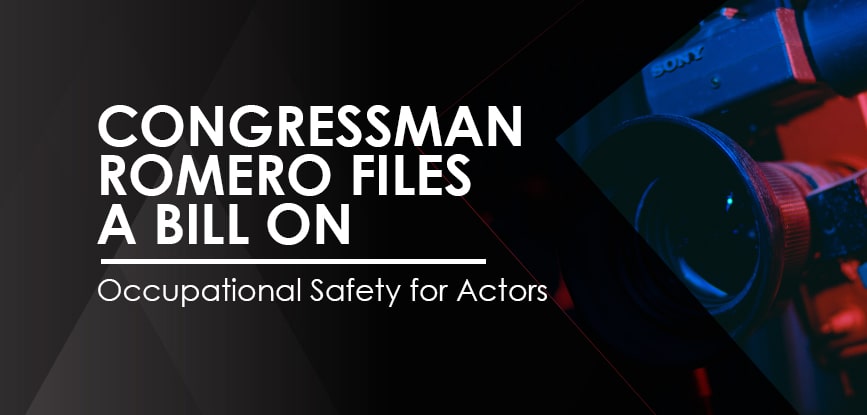
Occupational Safety for Actors Filed in Honor of Late Veteran Actor
1-PACMAN Party-list Representative Michael Romero, the stepson of the late Eddie Garcia, filed House Bill (HB) No. 181, or the Actors Occupational Safety and Health Standard Bill to prevent work-related fatalities in the entertainment industry. He seeks to introduce occupational safety and health standards to individuals working for film, theater, and television productions. HB 181 is otherwise known as the “Eddie Garcia Act” in honor of his stepfather.
“The film, television, and theater industry involves a unique business, and as such, presents several unique health and safety hazards that require special attention,” said Romero.
Under HB 181, the entertainment industry must provide a safe workplace for all workers and employees. Safety and health protocols must be in place to prevent and mitigate injuries caused by strenuous activities during shoots, illness, or death. The bill would also require actors to receive insurance.
Romero also proposed to lessen the working hours on movie sets between 8 to 12 hours. In some cases, longer taping and shooting hours in films and television dramas lead to actors and actresses arriving late on the set, which is the cause of delays that may put the health of the involved personnel and talent at risk. The bill will also cover the waiting hours between takes and other safety and security measures.
Labor Groups Support Romero’s Proposed House Bill
Various pro-labor organizations applaud Romero’s filing of the “Eddie Garcia Act.” The Partido Manggagawa (PM), Trade Union Congress of the Philippines (TUCP), and the Federation of Free Workers (FFW) expressed their support for the proposed measure.
PM Chairman Renato Magtubo says that some lawmakers who previously worked in show business must have the initiative to push for the bill’s passage. He hopes that the act will pave the way for the allocation of medical personnel during television and film production, lifesaving medical equipment, and an ambulance.
TUCP Spokesman Alan Tanjusay hopes for the bill’s immediate passage to ensure compliance during production. He also added that Romero’s proposal would cover the “emerging occupational safety and health issues” and its scope is enough to secure safety specific standards in the entertainment industry.
FFW Vice President Julius Cainglet also supports the measure, but concerned and affected parties should engage in a dialogue with Congress to identify the best possible solution to ensure the safety of the industry’s workers.
“We hope producers and other employees, on one side, and actors and other employees, on the other, should engage in social dialogue to determine what is best for the industry and all its workers,” Cainglet said.
DOLE to Gather Additional Insights for Occupational Safety Bill for Actors
The Department of Labor and Employment (DOLE) will discuss the proposed legislation on occupational safety in the entertainment industry with stakeholders to identify possible concerns of parties that may be affected by HB No. 181.
According to Labor Assistant Secretary Benjo M. Benavidez, the presentation of HB 181 to the Tripartite Executive Committee (TEC) and the Tripartite Industrial Peace Council (TIPC) can help the labor agency determine their position in the proposed bill. Both councils will have representatives from management and labor groups.
“The resolution (from TEC and TIPC) helps in fast-tracking (the passage of) legislation,” Benavidez said in an interview on July 9.

